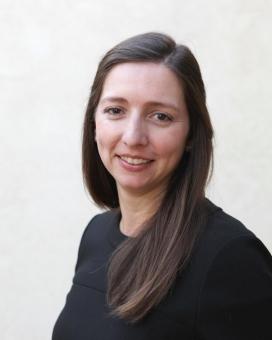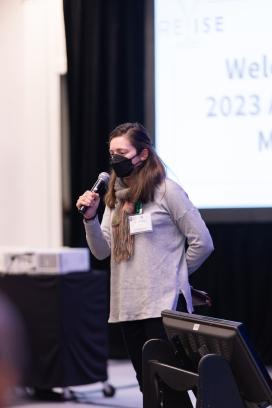Meet REVISE: Pati Ruiz
We are excited to share our interview with Pati Ruiz, one of the co-principal investigators and the Director of Digital Infrastructure at REVISE.
"The REVISE Center is dedicated to advancing equity across the informal STEM education field, and we look forward to working with the community to develop resources and tools to help the informal science education community create more equitable learning environments that are relevant to the experiences and cultures of all learners, especially learners from historically excluded communities."

What inspired you to join REVISE?
I was drawn to join the Reimagining Equity and Values in Informal STEM Education (REVISE) team because of the people involved in the project. The center also has a strong mission which includes leveraging the strength of community-building to establish long-lasting compassionate relationships, particularly in building trusting relationships among historically disenfranchised communities. I look forward to getting to know the REVISE team, our partners, advisors, and the broader AISL (Advancing Informal STEM Learning) and AISL-aspiring community. Specifically, I want to continue to learn from this community and support increased diversity in leadership and advancing the customized adaptation of informal science education program components to empower new learners and leaders with diverse perspectives to influence informal STEM.
What do your current partnerships look like?
I was a classroom teacher for many years and my work continues to center student and teacher voices through research practice partnerships (RPPs). In one of those research practice partnerships, Districts Helping Districts, we work as part of a RPP to build on prior work that designed inclusive K-12 computing pathways. This project focuses on addressing ongoing equity dilemmas and student achievement gaps in K-12 computing. To do this we are working with a project team that includes eight diverse school districts, who collectively explore practices for sustainably scaling the inclusive CT pathways model that partnering districts have individually designed and implemented over the past three years. The goal is for district leaders and teachers to develop skills and support systems to effectively implement cumulative, consistent, and competency-based learning opportunities in each grade, K-12.
In another similar RPP project, I worked with teachers at two school districts in rural eastern Kentucky to bring student voices to the development of computing pathways. Our project team was interested in supporting educators in conducting student empathy interviews that would help them learn about students’ understanding of computing, as well as their relationships with digital technology as both a social activity and source of identity. We wanted to co-design locally relevant interview protocols that teachers and administrators can deploy themselves, and promote conversational exchanges with their students. This work allowed teachers to meaningfully engage with their students and make modifications to their pathway.
The ultimate goal of that project was connecting teachers with students so that the voices of students, especially the voices of those who have experienced exclusion because of their race, academic achievement record, and access to after school programs, could be centered in the development of their district computing pathway. It brought student voices to the table that speak specifically to the rural eastern Kentucky community and experience allowing for educators to consider the needs of their students and make connections to their students’ identities, lives, and interests as they work to continue developing their district-wide computing pathways.

What are you most excited about or looking forward to accomplishing while working on REVISE?
In the immediate future, I am excited to work with the REVISE team to plan our upcoming 2023 AISL Principal Investigator (PI) Meeting that will be held from December 6th-8th. This gathering will help us learn about the community and give us the time and space to come together to learn about our work and share goals, challenges, and opportunities.
Where have you seen movement/progress in equity in the informal science community?
I am inspired by the meetings we’ve been having with the REVISE team, our advisors, and the broader AISL community. There is a growing awareness of the need to address equity issues in informal STEM education, and there have been a number of initiatives and projects that have been launched to address these issues including a few recently funded AISL projects like: Collaborative Research: Reimagining Educator Learning Pathways Through Storywork for Racial Equity in STEM and Racial Equity: Expanding Mathematical Futures Through Multimedia Storytelling.
The REVISE Center is dedicated to advancing equity across the informal STEM education field, and we look forward to working with the community to develop resources and tools to help the informal science education community create more equitable learning environments that are relevant to the experiences and cultures of all learners, especially learners from historically excluded communities.